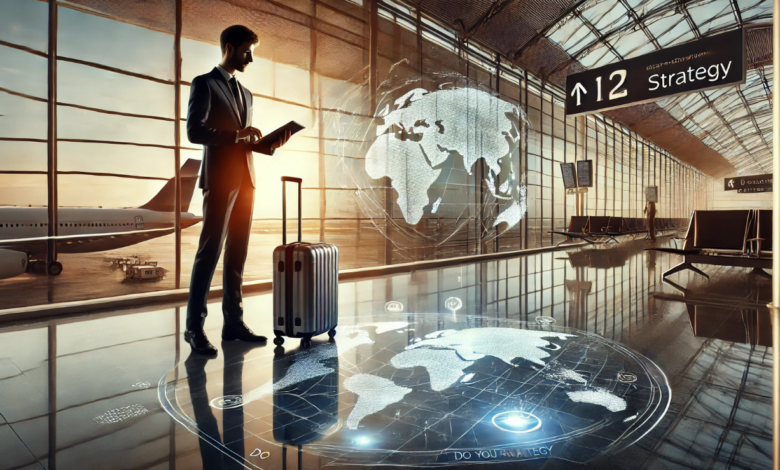How Traveling for Strategy Can Enhance Your Business Goals

In today’s fast-paced world, travel has become more than just a leisure activity; it’s a powerful tool for innovation, networking, and achieving business success. The question “do you travel for strategy?” sparks curiosity about how strategic travel can improve decision-making, foster creativity, and provide a competitive edge. This article explores the benefits of traveling for strategy, when and why it’s essential, and how to make the most of it for your personal and professional growth.
What Does It Mean to Travel for Strategy?
Traveling for strategy involves journeying with a purpose beyond routine tasks. Whether it’s for business meetings, industry conferences, team retreats, or market research, strategic travel is centered around achieving specific objectives. It’s about gaining insights, building relationships, and exploring opportunities that can’t always be achieved from your desk.
For example:
- Attending a global summit to understand emerging market trends.
- Visiting key stakeholders to strengthen partnerships.
- Exploring a new location to scout for business expansion opportunities.
Why Traveling for Strategy Is Important
1. Broadens Perspective
Travel exposes you to different cultures, markets, and ways of thinking. By stepping out of familiar environments, you gain fresh perspectives that fuel creativity and innovation.
2. Builds Stronger Relationships
Face-to-face interactions create stronger bonds compared to virtual communication. Traveling to meet clients, partners, or team members shows dedication and builds trust.
3. Encourages Creative Problem-Solving
Changing your surroundings can spark innovative ideas and solutions to complex problems. Immersing yourself in new environments often leads to out-of-the-box thinking.
4. Helps Identify Opportunities
Traveling to a new market or region allows you to observe local needs, preferences, and trends, providing insights for potential business growth.
When Should You Travel for Strategy?
Traveling for strategy should be intentional and aligned with your goals. Here are scenarios where it’s beneficial:
1. Market Research
When launching a product or service in a new region, traveling to the location helps you understand consumer behavior, competition, and logistical challenges.
2. Building Partnerships
Meeting key stakeholders, investors, or suppliers in person strengthens relationships and facilitates smoother collaborations.
3. Industry Events
Attending conferences, trade shows, or summits provides networking opportunities and keeps you updated on industry trends.
4. Team Building and Retreats
Strategic off-site meetings and retreats allow teams to focus on long-term planning, fostering collaboration and unity.
How to Make the Most of Strategic Travel
1. Define Clear Objectives
Before planning any trip, outline what you aim to achieve. Whether it’s gathering insights, signing a deal, or brainstorming with your team, having clear goals ensures productive travel.
2. Research and Plan Ahead
Study the location, culture, and logistics in advance. If attending an event, identify key sessions and people you want to connect with.
3. Stay Flexible
While having a plan is essential, remain open to unexpected opportunities or challenges that may arise during the trip.
4. Balance Work and Exploration
Incorporate moments to explore the destination. Experiencing the local culture can inspire new ideas and refresh your mind.
Key Benefits of Traveling for Strategy
1. Professional Growth
Strategic travel allows you to learn from industry leaders, exchange knowledge, and stay ahead of market trends.
2. Enhanced Communication Skills
Interacting with people from diverse backgrounds improves your ability to adapt and communicate effectively.
3. Personal Development
Travel challenges you to step out of your comfort zone, fostering resilience, adaptability, and problem-solving skills.
4. Competitive Advantage
Businesses that prioritize strategic travel often gain a competitive edge by identifying opportunities and building stronger networks.
Challenges of Traveling for Strategy
While the benefits are immense, there are challenges to consider:
1. Costs and Budgeting
Strategic travel can be expensive. Proper budgeting and identifying cost-effective solutions are critical.
2. Time Management
Balancing travel with regular work responsibilities requires careful planning to avoid disruptions.
3. Environmental Impact
Frequent travel contributes to carbon emissions. Opt for eco-friendly travel options and offset your carbon footprint where possible.
Examples of Strategic Travel Success
1. Market Expansion
A startup founder traveled to Asia to research market potential for their tech product. By meeting local distributors and understanding consumer behavior, they successfully launched in the region and grew their customer base.
2. Strategic Partnerships
A CEO attended an international conference and forged connections with global partners. These relationships led to lucrative collaborations and business expansion.
3. Team Innovation Retreats
A company organized an off-site retreat for its leadership team in a scenic location. The focused environment resulted in groundbreaking ideas and a clear roadmap for future growth.
Frequently Asked Questions (FAQs)
1. What is strategic travel?
Strategic travel involves traveling with a purpose to achieve specific business or professional objectives, such as networking, market research, or team building.
2. Is traveling for strategy expensive?
While there are costs involved, careful planning and prioritization can help manage expenses. The benefits often outweigh the costs when aligned with clear goals.
3. How does travel improve strategy?
Travel exposes you to new ideas, cultures, and perspectives, helping you think creatively and make informed decisions.
4. Can individuals benefit from strategic travel?
Absolutely! Whether you’re an entrepreneur, freelancer, or professional, traveling for strategy can enhance your skills, knowledge, and opportunities.
5. How can I reduce the environmental impact of travel?
Opt for eco-friendly options like trains or hybrid vehicles, stay in sustainable accommodations, and offset your carbon emissions through green initiatives.
Conclusion
The question “do you travel for strategy?” underscores the transformative power of intentional travel in achieving business and personal goals. From gaining fresh perspectives to forging meaningful relationships, strategic travel is a catalyst for growth and innovation. By planning effectively, setting clear objectives, and embracing opportunities, you can unlock the full potential of traveling for strategy.
Whether you’re attending a global summit, exploring new markets, or brainstorming with your team in an inspiring location, travel with purpose and watch your vision turn into reality.



